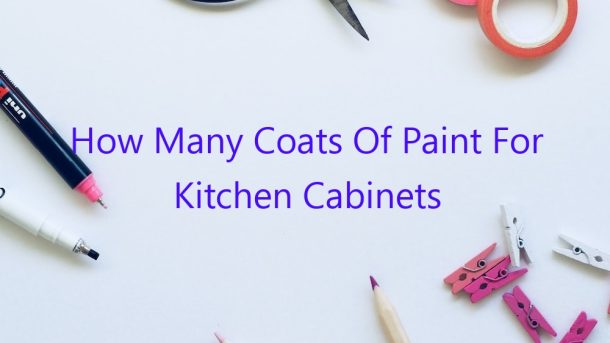There is no one perfect answer to this question, as the number of coats of paint you’ll need for kitchen cabinets will vary depending on the paint you choose, the condition of your cabinets, and your painting technique. However, a general rule of thumb is that you’ll need two coats of paint for kitchen cabinets, with a third coat being necessary for high-traffic areas.
When it comes to selecting the right paint for your kitchen cabinets, there are a few factors to consider. The first is the sheen of the paint. Paints with a higher sheen will show every imperfection in your cabinets, while paints with a lower sheen will cover up these imperfections. If your cabinets are in good condition, a lower sheen paint may be a good option.
The second factor to consider is the type of paint. There are two types of paint available: latex and oil-based. Latex paints are water-based and easier to clean up than oil-based paints, but they typically don’t last as long. Oil-based paints are more durable, but they can be more difficult to clean up and may not be as environmentally friendly.
Once you’ve selected the right paint, it’s time to start painting your cabinets. The best way to do this is to start with the doors and then move on to the cabinets themselves. Be sure to use a high-quality paintbrush for a smooth, even finish.
If you’re painting your cabinets for the first time, it’s a good idea to start with a practice run. Paint a small section of your cabinets to see how the paint applies and how long it takes to dry. This will help you to determine how many coats of paint you’ll need and how long you’ll need to allow for drying time.
Ultimately, the number of coats of paint you’ll need for kitchen cabinets will vary depending on the paint you choose, the condition of your cabinets, and your painting technique. However, a general rule of thumb is that you’ll need two coats of paint, with a third coat being necessary for high-traffic areas.
Contents
Can you do 3 coats of paint on cabinets?
Paint is one of the most popular ways to update the look of your cabinets. Whether you are repainting your cabinets to match a new color scheme in your kitchen or you are trying to cover up a previous paint job that you aren’t thrilled with, painting your cabinets is a project that you can do yourself.
One question that people often have is how many coats of paint they should apply. The answer to this question depends on a few factors, including the type of paint you are using, the condition of your cabinets, and the color of the paint.
In general, you will want to apply at least two coats of paint to your cabinets. If you are using a high-quality paint, you may be able to get away with applying just one coat. However, if your cabinets are in bad condition or if you are using a low-quality paint, you will likely need to apply three coats.
It is important to note that the number of coats of paint you need to apply may vary depending on the color of the paint. Darker colors will likely require more coats than lighter colors.
If you are unsure of how many coats of paint you need to apply, it is always best to start with two coats and then add a third coat if necessary. This will ensure that your cabinets are well covered and that the paint will not chip or peel.
When painting kitchen cabinets do you sand between coats?
When painting kitchen cabinets, there are typically three coats of paint that are applied. The first coat of paint is a primer, the second coat is the color and the third coat is a clear sealant. Between each coat of paint, it is necessary to sand the cabinets in order to ensure a smooth finish.
The type of sandpaper that should be used between coats of paint depends on the type of paint that is being used. If a latex paint is being used, then a 220-grit sandpaper should be used. If an oil-based paint is being used, then a 120-grit sandpaper should be used.
After the cabinets have been sanded, it is important to wipe them down with a clean cloth to remove any dust or debris. Then, the cabinets can be painted with the desired color.
It is important to note that if a dark color is being used, two coats of primer may be necessary. In this case, it is necessary to sand between the coats of primer, using a 220-grit sandpaper.
After the cabinets have been painted, it is important to apply a clear sealant in order to protect the paint from chipping and fading. A clear sealant can be purchased at any hardware store.
How many times should I prime my cabinets before painting?
When painting your cabinets, you will likely need to prime them first. But how many times do you need to prime? This depends on a few factors, such as the type of primer you are using, the condition of the cabinets, and the paint you are using.
Generally, you will need to prime your cabinets at least two times. The first time, you will need to use a bonding primer. This primer will help to adhere the paint to the surface of the cabinets. The second time, you will need to use a finishing primer. This primer will help to create a smooth surface for the paint to adhere to.
If the cabinets are in good condition and the paint is in good condition, you may only need to prime once. However, it is always best to err on the side of caution and prime twice. This will help to ensure a smooth, even finish on your cabinets.”
Is it better to roll on or brush on paint kitchen cabinets?
When it comes to painting kitchen cabinets, there are two main methods: rolling on and brushing on. Both have their own advantages and disadvantages, so it can be difficult to decide which is the best option.
Rolling on paint is the simpler option. All you need is a roller and a paint tray. The paint is applied evenly and quickly, so it’s a good choice if you’re in a hurry. However, it can be difficult to achieve a smooth finish, and it’s easy to miss areas.
Brushing on paint is more time-consuming, but it gives you more control over the finished result. You can achieve a smooth finish and it’s easier to avoid streaks and missed areas. However, it’s more difficult to apply paint evenly with a brush.
What kind of paint is best for kitchen cabinets?
A lot of factors come into play when deciding what kind of paint is best for kitchen cabinets. The first step is to assess the condition of your cabinets. If they are in good condition, you can probably get away with a less expensive paint. If they are in poor condition, you may need to invest in a more durable paint.
Another important factor is the color of your cabinets. If you want to paint them a different color, you’ll need to choose a paint that is compatible with the existing paint. If you are just repainting your cabinets the same color, you can choose any type of paint you want.
The final factor to consider is the type of surface you are painting. If you are painting a previously painted surface, you can use any type of paint. If you are painting a surface that has never been painted before, you’ll need to use a paint that is compatible with the surface.
In general, latex paint is a good option for kitchen cabinets. It is durable, easy to clean, and comes in a wide variety of colors. If you are looking for a more durable paint, you may want to consider using an oil-based paint.
What paint is best for kitchen cabinets?
When it comes to painting your kitchen cabinets, there are many different factors to consider. But the most important question is: What paint is best for kitchen cabinets?
There are a few different types of paint you can use on your kitchen cabinets: oil-based paint, latex paint, and enamel paint. Oil-based paint is the most durable and the best option for high-traffic areas, such as the kitchen. Latex paint is a good option for cabinets that are in good condition and don’t need any repairs. Enamel paint is a good choice for cabinets that are in bad condition and need to be repaired.
In addition to the type of paint, you also need to consider the color of the paint. There are many different colors to choose from, so you can find the perfect color for your kitchen.
Finally, you need to consider the type of finish you want on your cabinets. There are several different finishes to choose from, including matte, satin, semi-gloss, and gloss. The type of finish you choose will depend on the look you want and the type of cabinets you have.
So, what paint is best for kitchen cabinets? It depends on the type of cabinet, the color of the paint, and the type of finish you want. But in general, oil-based paint is the best option for kitchen cabinets.
What paint do professionals use for kitchen cabinets?
When it comes to painting kitchen cabinets, professional painters have a few go-to paint brands that they trust. In this article, we’ll take a look at some of the best paints for kitchen cabinets and what makes them so popular among professionals.
Sherwin-Williams ProClassic Interior paints are a favorite among professional painters. These paints are known for their high-quality finish and long-lasting durability. They come in a variety of colors and finishes, making them a versatile option for any kitchen.
Benjamin Moore Advance paints are another popular choice for kitchen cabinets. These paints are known for their low-VOC formula, which makes them safer for your family and the environment. They also come in a variety of colors and finishes, making them a versatile option for any kitchen.
If you’re looking for a paint that is both durable and environmentally friendly, then you may want to consider using GreenShield paints from Behr. These paints are made with a water-based acrylic formula, which makes them both durable and safe for your family. They come in a variety of colors, making them a versatile option for any kitchen.
No matter what brand of paint you decide to use, make sure to always follow the manufacturer’s instructions for application. Proper preparation is essential for a successful paint job, so make sure to clean and sand your cabinets before painting them.




